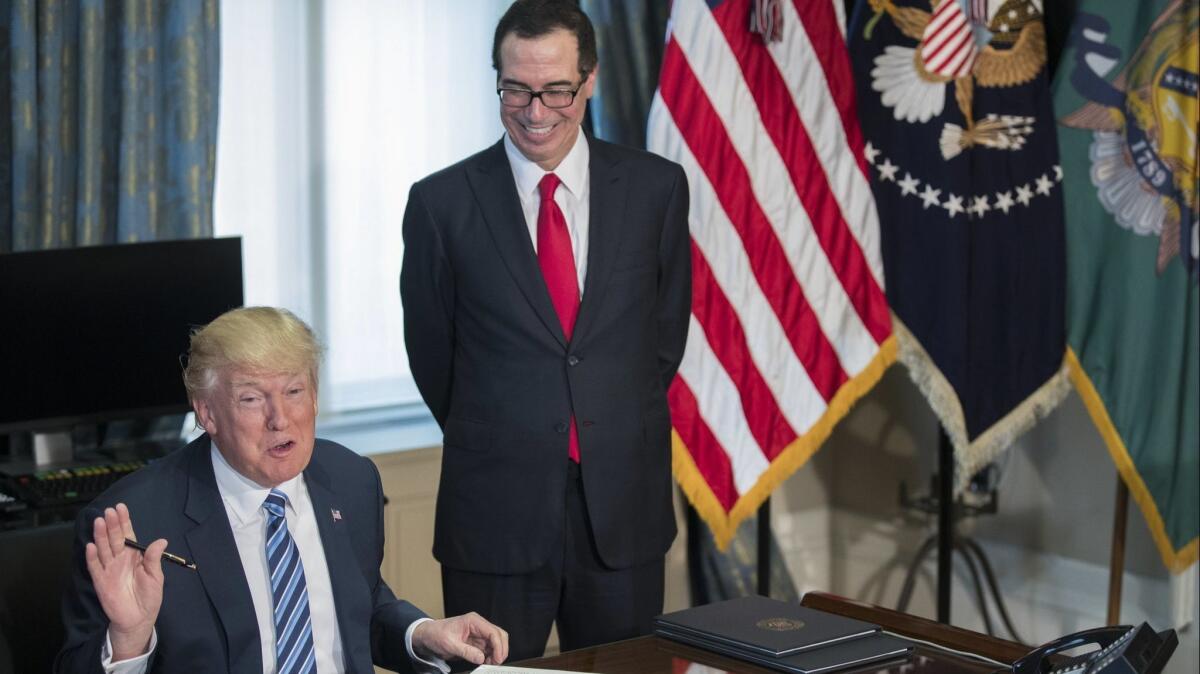Dead people got $1 billion in COVID-19 stimulus checks, watchdog says

- Share via
WASHINGTON — The federal government’s internal watchdog said Thursday that the IRS sent stimulus checks to more than 1 million dead people — worth more than $1 billion — under the coronavirus relief package approved earlier this year.
In the first of a series of reports on the government’s coronavirus response, the Government Accountability Office also warned that the popular Paycheck Protection Program has had limited safeguards and insufficient guidance and oversight planning, increasing the risk that borrowers may misuse or improperly receive loans.
“There is a significant risk that some fraudulent or inflated applications were approved,” the report states.
The report noted that as of April 30, nearly 1.1 million dead people received a stimulus check, totaling $1.4 billion, and urged the IRS to determine the best way to recoup the money.
To keep it from happening again if future stimulus checks are approved, the GAO recommended that Congress pass legislation giving the Treasury Department access to Social Security Administration death records, and requiring their use to determine if someone is eligible.
The IRS has full access to the death data maintained by the Social Security Administration, but the Treasury Department, which distributed the payments, does not.
The report stated that the Small Business Administration, which administers the $670-billion Paycheck Protection Program, would not provide details on how it conducted its review of loans larger than $2 million, or on specific oversight plans for the more than 4 million loans of less than $2 million.
Earlier this year, the administration rushed to process millions of small business loans as the economy shuttered in response to the COVID-19 pandemic. To date, it has made 4.7 million loans to struggling small businesses worth more than $516 billion, including more than 550,786 loans worth a total of $67 billion in California. The money does not need to be repaid if funds are used to keep workers on the payroll and other conditions are met.
Some large, publicly-traded companies have returned loans worth tens of millions of dollars after a public backlash. The program was designed to keep small businesses afloat, and the Treasury Department, which oversees the Small Business Administration, has pledged to review the recipients.
Treasury Secretary Steven T. Mnuchin angered members of Congress recently when he indicated in testimony before the Senate Small Business Committee that the administration may not disclose the names of those who took out loans.
The Small Business Administration and the Treasury announced Friday that they would release the names and dollar ranges of recipients who got loans of $150,000 or more.
The GAO singled out the agency for withholding data it needed to conduct oversight.
The agency responded in the report by saying they produced more than 420 pages of documents to the GAO and made officials available for hours. But on PPP loan data, the agency said it “cannot simply take a spreadsheet used on a public [Freedom of Information Act] website for traditional loan programs and populate it with PPP loan information.”
The GAO noted that the documents provided were largely publicly available information, and that the interviews came more than six weeks after they were initially requested.
The payments to dead people represent a tiny share of the more than 160 million payments made, but received widespread attention.
The report includes the first major detailing of how those payments were made, with the agency stating in its response that IRS counsel initially “determined that IRS did not have the legal authority to deny payments to those who filed a return in 2019, even if they were deceased at the time of payment.” That extended to people who filed in 2018, but had not yet filed a 2019 return.
But the report also disputes that claim, stating an unnamed Treasury official told the GAO that the agency was not aware of the issue “until it was reported in various media outlets.”
On May 6, the IRS announced that the money must be returned. But the GAO report states that the “IRS does not currently plan to take additional steps to notify ineligible recipients on how to return the payments.”
More to Read
Get the L.A. Times Politics newsletter
Deeply reported insights into legislation, politics and policy from Sacramento, Washington and beyond. In your inbox twice per week.
You may occasionally receive promotional content from the Los Angeles Times.











